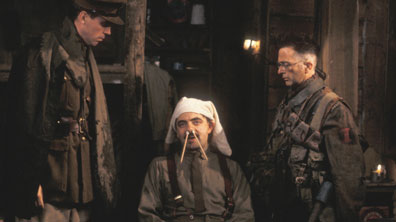
If you’re starting at Southfields Community College as a Year 12 Student on Tuesday, congratulations: you’ve read your Starter Pack! Welcome to our AS literature course. You’ve been directed here because this is the blog that we use to help prepare you for your exam at the end of the year. We’re excited to have you on board.
Before you move on to the task set for you here, why not roam around the website. Start with our Welcome page at the bottom of the ‘Recent Posts’ column you’ll find on the right– it briefly explains the subject of the course and the purpose of this blog. Check out some of the articles on Move Him Into the Sun relating to the First World War, and note how last year’s students used them to engage in discussion (‘Poppy Wars’ gives you a flavour of the kind of interesting things we find ourselves debating). Click on words and phrases in the ‘Category Cloud’ and ‘Themes, Issues and Events’ boxes to introduce yourself to some of the recurrent themes in our study of First World War literature. If you’d like, you can even ask me a question by clicking on the ‘Ask Mr. Griffiths’ tab at the top of the blog. I can’t promise you a satisfactory answer, but I’ll do my best to help you! Take a look around– see what interests you.
We’ll be using this blog throughout the year to widen our reading and search for meaning in the poetry and prose that we read, its unifying subject: the First World War.
Now, I don’t know how much you know about the First World War. I don’t know anything about the First World War! you may be thinking. I’ve made a terrible mistake! might follow on from this. Goodbye, cruel world! would almost certainly be an excessive reaction, and if you’re thinking this, I’d call a doctor. But don’t panic. I find that most people who begin the course know little about the conflict: one year a student asked me if Henry VIII was king when the war started. She ended the year with a ‘B’ and went on to write one of the best A2 essays I’ve ever read. Ignorance is no crime: and why are you doing an A-level, if not to learn?
By the end of the year you’ll know the history of the war, through the study of the many brilliant poems, books, memoirs and plays written by those effected by it. The only crime is to be incurious– or to dismiss the subject before you start. I’m not interested in the First World War! you may object. Here I quote Yoda from Star Wars: “You will be. You will be”. Why? Because there is no aspect of your life, or that of countless millions of others, that has not been affected by this conflict. You just don’t know why yet.
Off you go. Take a look around.
Back again? Excellent.
In ‘Starter for 12’ I’m going to post some links to some websites that will help you get to grips with how the First World War started. We’ll begin at the beginning, with the origins of the First World War.
The origins of the First World War are, to someone new to the subject, very difficult to grasp. The war began almost a hundred years ago, in a world very different from our own. Nations handled their foreign policies in a way that seems, well, foreign to us. People felt patriotic in a way we find hard to understand. Many welcomed the outbreak of war: they were excited by it. These things can seem very strange at a distance. Yet, as difficult as it can be, I’d like you to try and acquaint yourself with some of the explanations for how the war began. It’s going to be tough, but… let’s try and be smarter than Baldrick!

Over at FirstWorldWar.com you’ll find a good summary of the events that led up to the outbreak of World War One. Read ‘How It Began’, ‘The Causes of World War One’, ‘Archduke Ferdinand’s Assassination’ and ‘The July Crisis’. Don’t worry if it’s all too much too take in at once; but make notes to help you understand the European Alliance system that so disastrously led to war. You’ll also find two articles on the BBC website that help explain the origins of the war: the first, by Dr Gary Sheffield, argues that war with an aggressive and autocratic Germany was inevitable: a little controversial, but well argued. The second, by Dan Cruikshank, conveys the fear of German militarism that existed in Britain before the war.
I’ll ask to see the notes you’ve made from these websites in the lesson we have on Wednesday.
If you have access to Youtube, you’ll find some interesting documentaries that can give you a broad idea of what life in Britain was like before the war. The best one for our purposes is Andrew Marr’s The Making of Modern Britain: The Road to War. Watch this to understand the social tensions in Britain from 1906 to 1914: and, if you’ve got time, you might even go on to watch its follow-up, ‘The Great War’. Again, as a matter of good practice, you should make notes to help you contextualise the poetry, books and plays that you are going to read.
I will, of course, give you further information and extracts that will help explain how ‘the War to end all Wars’ began. This ‘Starter for 12’ task, however, is a crucial opportunity for you to inform yourself on how it all began– and impress us with your enthusiasm and ability to take on this, your English Literature AS level.
We begin, as we must, with history. Yet within the week we’ll be reading together some of the marvellous poetry that the terrible and momentous First World War has given us.

